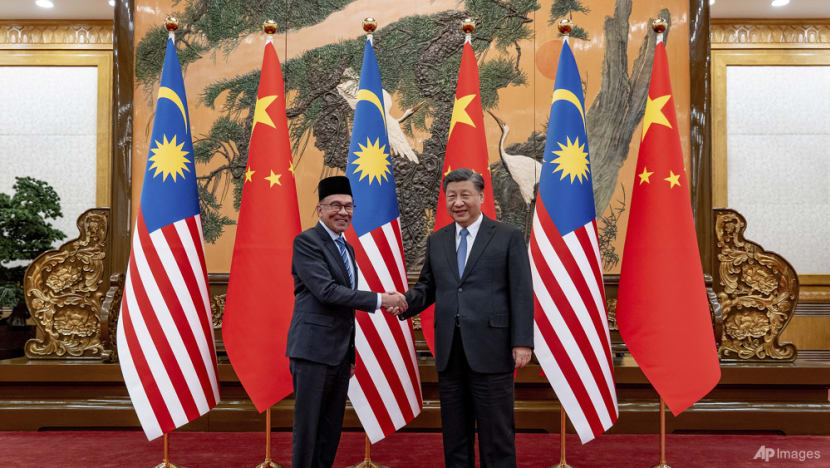Commentary: Malaysia and China mark an important milestone in diplomatic ties
Relations between the two countries have evolved considerably over the last half century. It is in China's interest to have a stable and prosperous Southeast Asia, says Asian Studies professor James Chin of the University of Tasmania.


This audio is generated by an AI tool.
HOBART, Australia: Friday (May 31) marks a half century of formal diplomatic ties between China and Malaysia, established on this day in 1974.
Ahmad Zahid bin Hamidi is currently on his first official visit to China as Malaysian Deputy Prime Minister, during which he will attend the 50th anniversary celebration in Beijing. Chinese Premier Li Qiang is also expected to visit Malaysia this year.
This milestone is not only important for the two countries but for the whole region as well.
A DRAMATIC EVOLUTION
The geopolitical environment was very different 50 years ago. China then was still formally supporting the Malayan Communist Party, which was involved in armed conflict against federal forces. Malaysia imposed restrictions on Malaysian Chinese citizens’ travel to China to prevent unwanted influence.
Then Malaysian prime minister Abdul Razak Hussein decided to establish formal ties with China to cement Malaysia’s reputation as a non-aligned country. He also understood the political significance of being one of the first countries in the region to do so amid China’s rise as a regional power.
More importantly, he had founded Barisan Nasional, a multiracial coalition in the aftermath of the 1969 race riots.
Upon this diplomatic milestone, the two countries agreed on principles that would guide their relations henceforth, including the non-interference in each other’s domestic affairs. China agreed to recognise issues related to the Malayan Communist Party as such, signalling it would limit its support, and that Malaysians of Chinese origin did not also have Chinese nationality.
Since then, overall ties have been relatively smooth. The communist threat waned with a peace treaty and ultimate dissolution of the Malayan Communist Party in 1989. The opening up of China under Deng Xiaoping accelerated trade ties and Malaysia began to relax its policy of allowing Malaysian Chinese to visit China. In a generation, China became Malaysia’s largest trade partner.
Malaysia-China relations were said to have hit new highs during the Najib Razak administration.
China played up the fact that his father was the one who opened up ties and he reciprocated by committing Malaysia to Chinese President Xi Jinping’s signature infrastructure Belt and Road Initiative (BRI). Najib was also motivated by the fact that China was the only major power willing to welcome him after the West shunned him in the wake of the 1Malaysia Development Berhad (1MDB) corruption scandal, signing deals and offering significant foreign direct investment to Malaysia during the later half of the Najib administration.
SOUTH CHINA SEA AND OTHER CONCERNS
Fast forward to today, China is now the world’s second-largest economy and has been Malaysia’s top trading partner for more than a decade. If there is fear, it is in the economic arena and security area.
Malay nationalists are afraid that the country will be too economically dependent on China for trade, investment and technology. Sections of the Malay establishment, which has typically been pro-West, are worried that China will replace the United States and the Western bloc as Malaysia’s key strategic partner in the near future.
Others are concerned about ongoing territorial disputes with China in the South China Sea. In 2023, Malaysia protested against China’s new map staking claim over disputed maritime areas in Sabah and Sarawak.
For years, Chinese fishing trawlers have been fishing in Malaysian waters off the coast of Sarawak, despite many diplomatic notes from Malaysia. Chinese naval vessels regularly sailed into Malaysian waters and attempts were made to build a small Chinese installation in one of the disputed islands.
Even those who think Malaysia should just keep walking a middle path between the West and China know this is becoming increasing hard in the face of growing Chinese military power.
From China’s perspective, Malaysia is probably the most important ASEAN country for geo-strategic reasons. Malaysia is the only country to straddle both sides of the South China Sea – peninsular Malaysia on one and Borneo on the other.
The Chinese know that if there is going to be any confrontation over China’s claim to South China Sea, Malaysia will be directly involved. Thus, Malaysia is a high priority for Beijing to deepen ties with and assert influence on.
Beijing has no military ambition when it comes to Malaysia, believing (correctly in my view) that inter-connected economic ties between the two would ensure that Malaysia will never confront Beijing openly. Over the long term, the BRI plan to build a high-speed train from Singapore to Kunming could link much of Southeast Asia to China.
Malaysia is one of the few countries whose ordinary passport holders are currently allowed visa-free entry into China for short visits. Chinese nationals form the largest group under the Malaysia My Second Home programme, which allows them to live as permanent residents for 10 years.
Xiamen University has established a branch campus ten minutes’ drive from Putrajaya, Malaysia’s seat of power. Thousands of Malaysians enrol in Chinese universities every year, a trend that will continue.
NEXT 50 YEARS?
As the two countries toast to their half-century ties, both sides are realistic about their future. Malaysia, like other Southeast Asian nations, is clear-eyed that there is no hiding from the Chinese shadow.
No one gets to pick their neighbour, but confrontation can be kept to a minimum and areas of mutual concern navigated carefully.
Beijing’s hard power has grown and its soft power will only gain traction in the coming years. China must know that aggressively flexing its economic power or military might in the South China Sea could turn Southeast Asians against it.
China and Malaysia are here today after 50 years of hard work and the give-and-take that characterises most foreign policy. But will what got them here get them through the next 50 years?
As the world’s centre of gravity shifts to the Asia-Pacific, it is in the interest of China – and India as major powers in this region – to have a stable and prosperous Southeast Asia. Pragmatism will continue to guide Malaysia-China diplomatic relations for the foreseeable future.
James Chin is Professor of Asian Studies at the Asia Institute Tasmania, University of Tasmania.


















